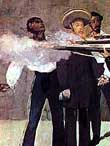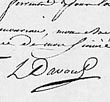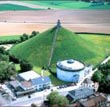| |
| |
EDITORIAL
It is a commonplace to state that 'Napoleon' is a macho subject. Indeed, a significant percentage of the books written in English on Napoleon deal with ‘male' experience specifically in military or political terms, most often the emperor's own. The female experience is frequently passed over - unless you count Josephine; but that's a story which is too often told drenched in rose-water.
Recent events in Italy however have shown that consideration of the ‘female' experience can enhance our understanding of the man and the period. In Rome in November 2006 the Museo Napoleonico and the Fondazione Primoli hosted a conference on the women of the Bonaparte family as protagonists, where participants talked of the power and sexual politics pursued by those redoubtable ladies. For the past four years, the provincial administration in Lucca has been encouraging interest in Elisa, considering her activities as ‘First Lady' in the city of Lucca in particular and in Napoleonic Tuscany in general. And now the VIIIth Forum Marengo (on today) has chosen to view Napoleon through female eyes. And this is in the wake of Marie Louise week at the Museo Glauco-Lombardi in Parma (November 2006). During the commemoration of the French decade in Naples (currently underway), there is sure to be much interest in another daughter of Letizia who 'wore the trousers', Queen Caroline. Indeed, lecturer Renata de Lorenzo of the Neapolitan university ‘Federico II' is soon to publish a biography of that erstwhile ruler. Antonietta Angelica Zucconi, of the Rome University, "La Sapienza", is working on a biography of Napoleone-Elisa, Elisa's daughter. The British Embassy in Paris (housed in Pauline's town house) is also pursuing a policy of highlighting their connection with the 'imperial venus', and historian Flora Fraser is currently working on a biography.
A hundred years after Frédéric Masson's pioneering work on the Imperial family, once again a look at the distaff side is bringing a fresh vision of the Napoleon and his times.
Peter Hicks

|
|
|
| |
THIS MONTH'S PAINTING
The execution of Maximilian, by Edouard Manet
On 1 July, 1867, the remarkable news of the execution of the emperor of Mexico, Maximilian, broke. Manet was strongly affected by it and felt drawn to try his hand at history painting in an attempt to express himself and this piece of breaking news…
Three versions of this painting are currently on show at the New York Museum of Modern Art (MoMA)

|
|
|
| |
ECKMÜHL MUSEUM SAVED
The small but interesting museum in Auxerre dedicated to Davout, which has been closed for the last 35 years, is soon to re-open. This collection of pieces bequeathed by Louis-Nicolas Davout's daughter would have closed for good had it not been for the enthusiasm and tenacity of local historian Alain Cattagni. As a result of his efforts, the museum is to be refurbished and and open to the public by appointment.

|
|
|
| |
WORK HALTS AT THE LION MOUND HAMLET
The great refurbishment work planned for Waterloo battle site planned by the Wallonia region and the company Culture Espace for 2009 has been halted by a decision taken by the Belgian Council of State (15 december, 2006). The Wallonia Region, Culture Espace and members of Parliament for Waterloo are appealing against the decision…

|
|
|
| |
200 YEARS AGO
13 January, 1807: Warsaw decree by which Napoleon ordered that the bridge built over the Seine opposite the Champ de Mars should be named after the victory at Jena (Iéna) of 14 October, 1806 (art 1).
«Art 2: The embankment on which the bridge is to be built, on the Chaillot side of the river, (the road here has to be widened and rebuilt along a different course) is to be called, in the section between the 'barrière' and the fire pumps, Quai de Billy, named after the general killed in that battle».
(Correspondance n°11619)
14 January, 1807: establishment in Warsaw (by decree) of a temporary Polish governing commission (Komisja Rządząca), of which Stanislaw Malachowski (1736-1809) was to be president.
Text of the decree.
(Correspondance no. 11630)
150 YEARS AGO
On 13 January, 1857, the Emperor and Empress saw the première of the French version of Giuseppe Verdi's four-act opera Il Trovatore, libretto by Salvatore Cammarano, after the play by the Spanish author, Antonio Garcia Gutièrrez.
(Moniteur universel, 14 January, 1857)
The opera was first performed in Italian in January 1853, and this version had already been performed in Paris at the Théâtre italien in December 1854.
On 15 January, 1857, the Prince Napoléon (the aged Jerome Bonaparte) organised a grand dinner at the Palais Royal. The dinner was presided over by the Prince Jérôme (Plon Plon) and was in honour of the generals, at that time in Paris, who had taken part in the recent Crimean War.
(Moniteur universel, 16 January, 1857)
Wishing you an excellent, Napoleonic, New Year.
Peter Hicks
Historian and Web editor
THE NAPOLEON.ORG BULLETIN, No 398, 12 - 18 January, 2007
Interested in the work of the Fondation Napoléon? Why not participate, either generally or in a specific project, by making a donation.
© this Napoleon.org weekly bulletin is published by the Fondation Napoléon. Reproduction or all or part of this bulletin is forbidden, without prior agreement of the Fondation Napoléon.

|
|
|
|
|
|
|
|
|
|
THIS WEEK in the MAGAZINE
PRESS REVIEW
Snippets:
The Musée d'Eckmühl in Auxerre
Work at the Lion Mound halted
WHAT'S ON
Conferences:
- VIIIth Forum Marengo - Napoleone e l'occhio di Minerva, punti di vista femminili e inconsueti sul mondo napoleonico
- Napoleon at the Zenith: a bi-centennial seminar, Liverpool, UK
Exhibitions:
- Manet and the Execution of Maximilian, MoMA, New York, USA
- Champignon Bonaparte - illustrations by Gilles Bachelet
- Dagoty in Paris - the Empress Josephine's porcelain manufactory, Reuil-Malmaison, France
- Napoleon III and Europe - 1856, Paris, France
- Public Portraits, Private Portraits 1770-1830, Grand Palais, Paris, France
- Louis Napoleon: at the court of the first King of Holland, 1806-1810, Apeldoorn, Netherlands
Got a problem with the letter? Try the home page: http://www.napoleon.org
<<
|
|




